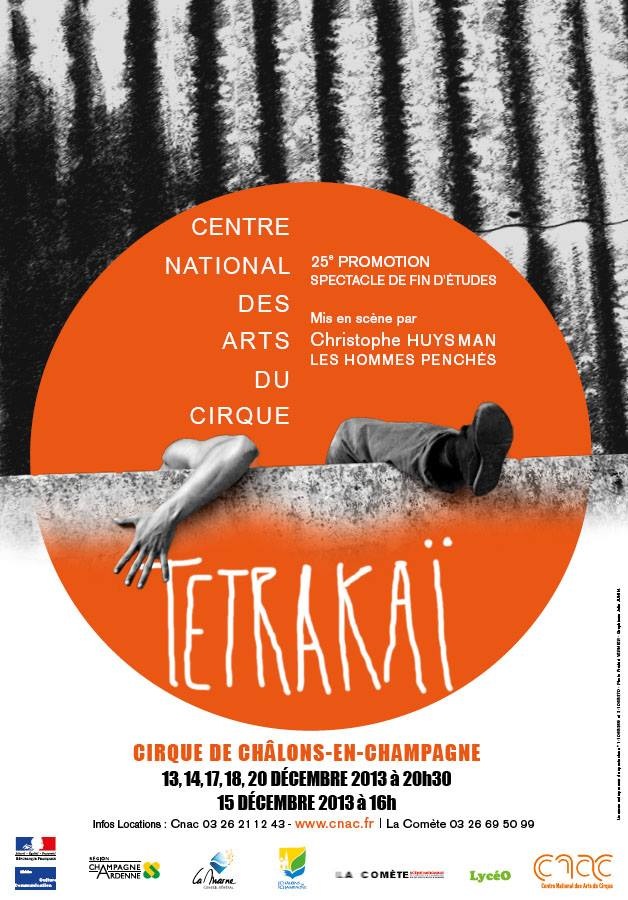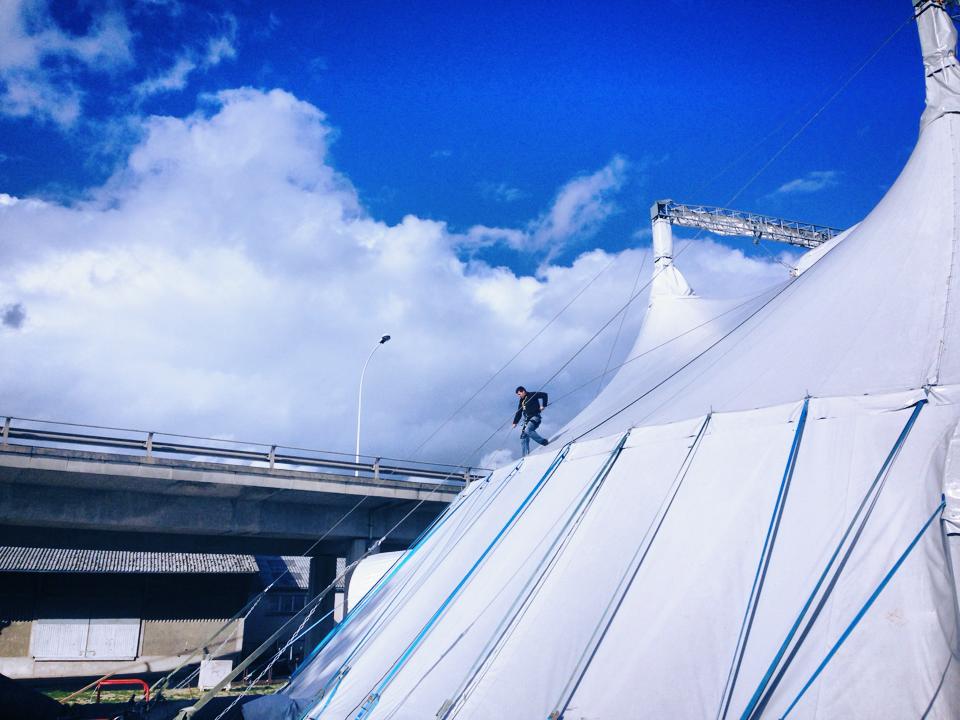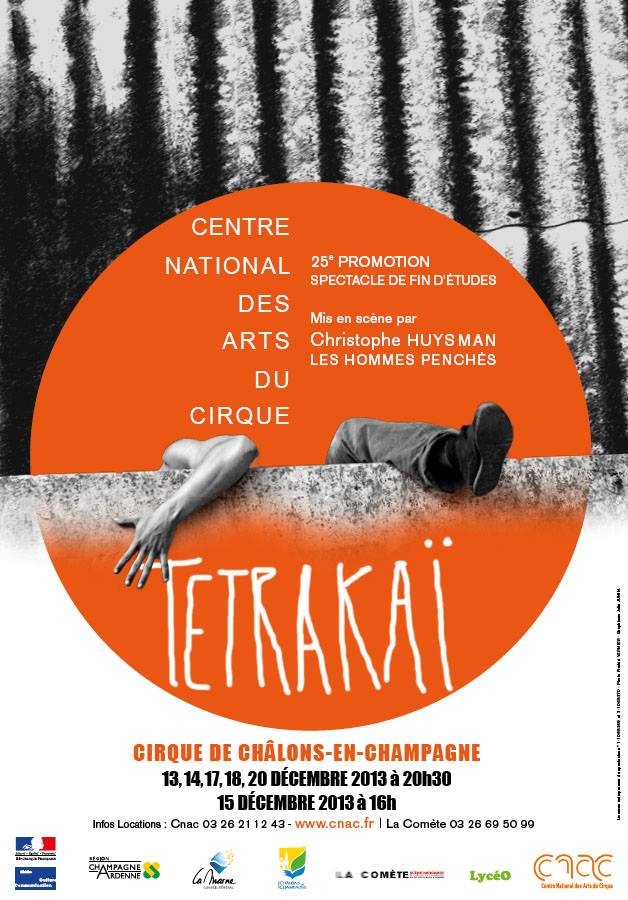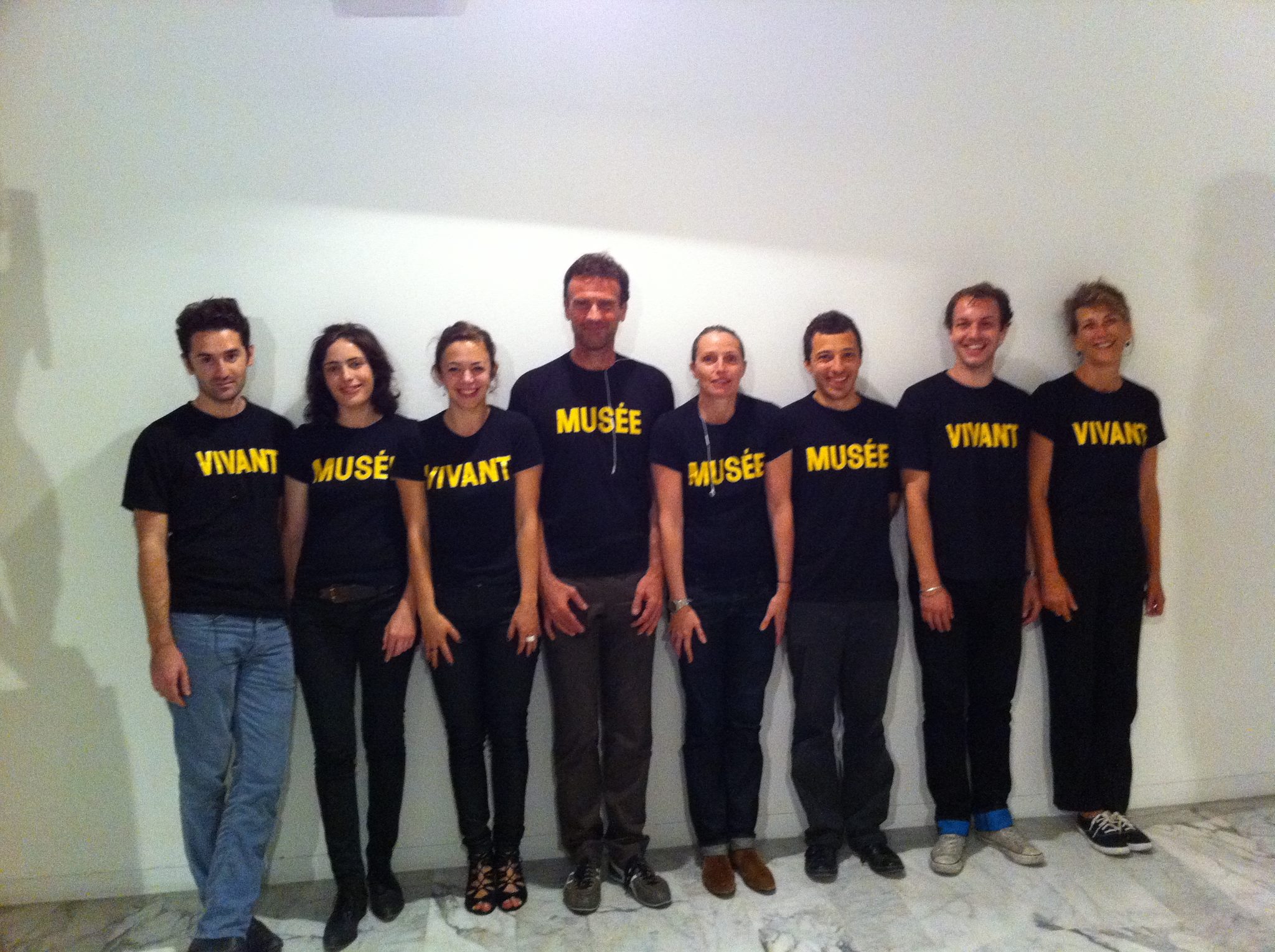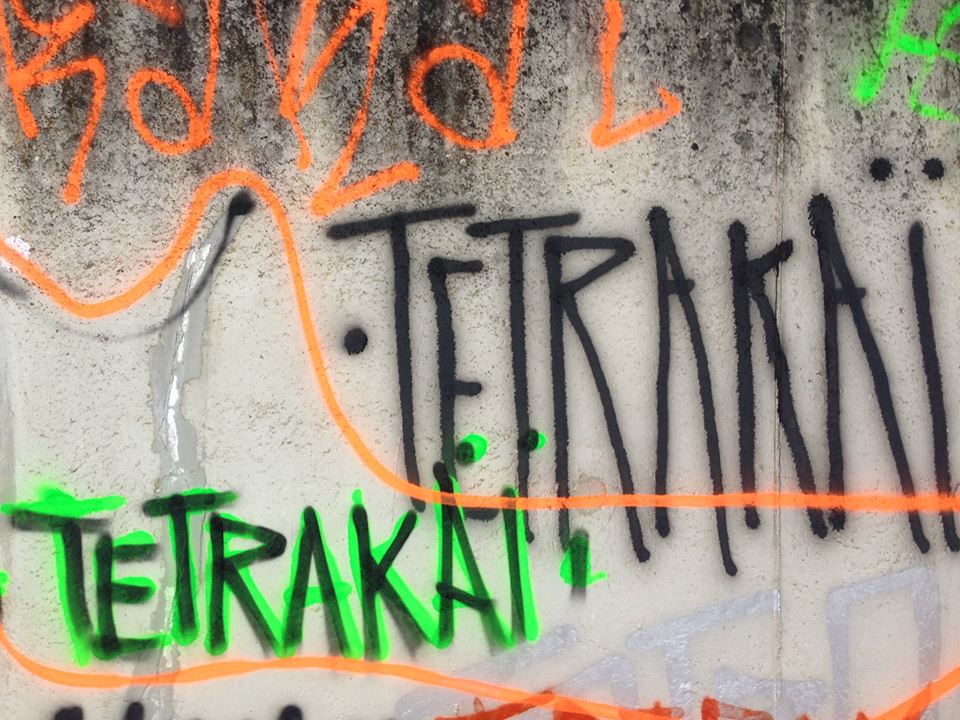■
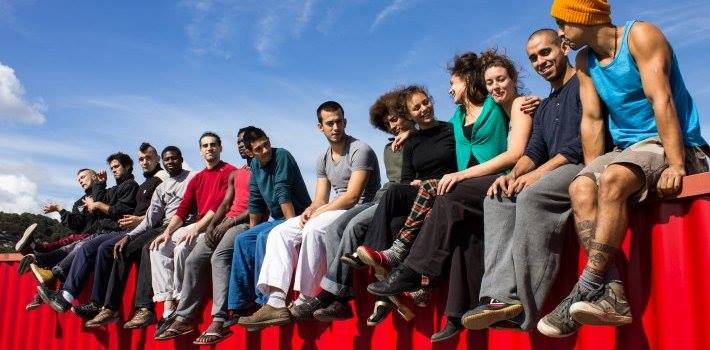
Iesu Escalante, Tamryn Escalante, Basile Forest, Santiago Howard, Andres Labarca, Victoria Martinez, Simon Nyiringabo, Philippe Ribeiro, Frédéri Vernier, Issouf Zemani ■
« J’ai 2 projets : vivre un peu beaucoup et vivre peut-être. Je ne prends rendez-vous qu’avec le hasard. » (Christophe Huysman, Carte postale 3) — TETRAKAÏ, est un spectacle de cirque grinçant pour 14 interprètes, 14 corps et voix dans une création inscrite dans un cercle complet. Avec 8 spécialisations circassiennes : mât chinois, portés acrobatiques, corde lisse, acrobatie, portique coréen, équilibres sur mains, trapèze Washington, trapèze.
CRÉATION :
13, 14, 17, 18 et 20 décembre 2013 à 20h30 Dimanche 15 décembre à 16h Jeudi 19 décembre séance scolaire à 14h30
au Cirque de Châlons-en-Champagne
EN TOURNÉE :

Du 15 janvier au 9 février 2014, Parc de la Villette Paris (75) [ relâche les lundis et mardis ] / Pour voir le spectacle à Paris : www.villette.com Les 3, 4 et 5 avril 2014, Théâtre municipal, Charleville-Mezières (08). Tél.+33 (0)3 24 32 44 50.
Les 24, 25 et 27 mai 2014, Le nouveau Relax, Chaumont (52).
Tél.+33 (03) 25 01 68 80.
Les 4, 5 et 6 juin 2014, Le Manège, Reims (51).
Tél.+33 (0)3 26 47 30 40.
Les 26 et 29 juin 2014, La Brèche, Cherbourg (50), Festival des Art’zimutés. Tél.+33 (0)2 33 88 33 99.
■ création de la lumière : Annie Leuridan ■ création sonore : Antoine Herniotte ■ costumes : Mélinda Mouslim ■ travail sur la voix : Chantal Jannelle ■ scénographie : Les Hommes penchés ■ balles motorisées : Sylvain Garnavault ■ régie générale : Julien Mugica ■ régie du plateau : Jacques Girier ■ régie de la lumière : Vincent Griffaut ■
Centre National des Arts du Cirque : www.cnac.fr
Les hommes penchés : http://www.leshommespenches.com/
DRAC Champagne Ardenne : www.curlturecommunication.gouv.fr

« Le sens de TETRAKAÏ se décompose ainsi : « tétra », le chiffre 4 en grec. « Kai » : c’est à la fois un terme calligraphique japonais (le format A4) ; la conjonction « et » en grec ancien, employé comme adverbe, il pourrait se traduire par « aussi ». »
ENTREVUE :
Septembre 2013 : Rencontre à la Brèche (Cherbourg) avec le metteur en scène Christophe Huysman après une semaine de répétitions. CYRIL THOMAS : D’où vient le titre de ce spectacle ?
CHRISTOPHE HUYSMAN : Il représente mon chemin vers la langue, le chemin du titre c’est mon chemin d’écrivain, ici carrément singulier. J’ai effectué une liste de titres dès que j’ai accepté cette mission. Un jour Sylvain (Decure) me dit : « pourquoi ne pas choisir un titre incompréhensible ? ». Nous voulions un titre qui emmène les spectateurs vers un autre sens lié aux sonorités et que tout le monde puisse s’approprier à sa manière. Le sens de TETRAKAÏ se décompose ainsi : « tétra », le chiffre 4 en grec. « Kai » : c’est à la fois un terme calligraphique japonais (le format A4) ; la conjonction « et » en grec ancien, employé comme adverbe, il pourrait se traduire par « aussi ». C. H. :Il s’agit de mon quatrième spectacle avec des interprètes de cirque : il y d’abord eu em>Espèce (2000-2006), un cartoons de corps en survies, puis HUMAN articulations (2006-2009), un cri de colère, une prise de parole dans nos vertiges, puis Le Mâtitube (2008-2010), spectacle de rue, un « gueuloir » qui exprimait une réaction épidermique aux élections de 2007. Dans TETRAKAÏ le chiffre « 4 » joue un rôle constructif dans ce projet. Nous sommes quatre au départ de cette aventure : Angela Laurier, Sylvain Decure, William Valet et moi. La piste est divisée en quatre entrées et sorties, il y a quatre gradins (sous chapiteau). Cette découpe particulière implique que les interprètes pensent différemment leurs déplacements, leur ouverture à l’autre pour être visibles de quatre endroits différents. Le cercle, la piste.
C.T. : Est-ce un défi pour vous de mettre en scène des étudiants ?
C. H. : C’est déjà les considérer comme des interprètes. Mettre en scène, c’est déjà un défi en soi, presque une figure de style ! En amont même de la réalisation, j’ai eu une rencontre avec chacun des interprètes. Cela m’a permis d’approcher l’humain, de les écouter et d’entendre, de scruter... J’aime travailler « l’air de rien » , je me fais « petit », j’écoute d’abord ce que j’ignore pour composer. Car l’exercice passionnant est de trouver une compréhension réciproque avec chacun des interprètes. Nous ne partons pas tous du même endroit, nous ne parlons pas du même endroit, personne parmi nous n’a le même vécu ni le même âge. Je ne suis pas arrivé avec une mise en scène toute prête. Ce spectacle a pour origine la confrontation des histoires personnelles, de petits événements, un dialogue.
C. H. : Je ne le considère pas comme un défi mais plutôt comme un lieu où je vais apprendre tout en « infusant » des savoirs. J’essaye de trouver avec les interprètes une nouvelle circulation de la parole, de la voix, une autre écriture du cirque. Il nous a fallu (avec Sylvain, William et Angéla) penser tous les éléments de manière radicale : le chapiteau, le placement du public, le son, la lumière et l’écriture, les agrès, la scénographie, pour explorer quelque chose qui puisse me concerner comme artiste. Donc d’abord tout remettre à plat. Faire le vide. Ne plus se souvenir et créer les espaces réels et mentaux qui nous laissent libre de nos références habituelles en telle circonstance. Effacer la facilité de reproduire. C. H. :C’est un cirque qui s’écrit aujourd’hui et s’inscrit dans l’actualité. L’actualité c’est ce qui passe au plus près de soi, sa propre actualité. Au tout début, il y a encore quelques semaines, je ne savais pas si nous allions écrire ce spectacle dans un pays en paix ou si la France allait s’engager dans des opérations militaires au Proche-Orient. Nous avons commencé à réfléchir tous ensemble à cette situation pour appréhender ce que signifie écrire un spectacle dans un pays en guerre. C. H. :J’ai aussi certaines « obsessions », quelques figures propres aux Hommes Penchés, (nom de la compagnie), s’intègrent petit à petit au processus de travail : les anonymes, les aveugles, l’ordinaire avec la chaise, la perte des repères habituels. Quant aux tables présentes sur scène, elles racontent une nouvelle histoire : elles servent d’établis ou de paillasses où les corps-matière viennent se forger : on cherche à déplacer l’ordinaire. C. H. :Ce choix scénographique radical, qui se limite aux agrès et à la matière brute ouvragée comme un espace dynamique et abstrait contribue à créer un autre rapport à la hauteur, à l’air, à la circulation des interprètes dans l’espace… Tous ces paramètres font du corps la matière première du spectacle à travers laquelle les éléments (lumières, sons, textes…) viennent s’articuler. Nous voulions prolonger la piste circulaire en traçant des lignes qui traversent même le public assis sur les gradins ainsi que les rampes d’accès. La scénographie se limite à deux couleurs, le noir et l’orange, pour créer d’autres perspectives visuelles. C. H. :C’est la première fois que, dans un de mes spectacles, je ne serai pas sur le plateau comme interprète. Dans cet exercice, mon rôle est de faire apparaître toutes les personnalités.Propos recueilli par Cyril Thomas, Septembre 2013.


- Carte postale diurne © Christophe Huysman 2013
Constituée de textes adaptés au rythme de la marche et de photographies, l’application Pas à Pas, invite le spectateur muni d’un smartphone à pénétrer au cœur d’une représentation théâtrale dématérialisée (les balades), à participer à un jeu de piste avec les cartes postales, ou encore à revitaliser le répertoire de la compagnie des Hommes penchés.
LES BALADES : Guidé par le son des écouteurs de son téléphone, l’utilisateur se promène dans les rues de la ville en écoutant un texte de Christophe Huysman : la rue devient décor, le corps des acteurs disparaît pour n’être qu’une voix ; petit à petit l’univers théâtral se met en place, les sons extérieurs, les éléments visuels, (architectures, hasard des croisements) viennent s’assembler pour créer un « théâtre fragment paysager » dans lequel le spectateur invente un spectacle personnel et inédit où sa position rejoint celle de l’acteur. C’est un théâtre pointilliste, fait de virgules visuelles et de respirations textuelles.
Une fois la balade terminée, l’utilisateur pourra relire/réécouter chez lui, ou dans un espace public qu’il aura choisi le texte et peut-être l’entendre alors très différemment.
espace espace esp
LES CARTES POSTALES : Un « jeu de pistes » dans la ville… par exemple :
le pont Jacob
le long de l’Escaut
le phénix
place de la République
Sur le plan de la ville, l’utilisateur peut apercevoir quelques points géolocalisés, ils correspondent à des cartes postales créées et disséminées par Christophe Huysman. L’utilisateur se promène alors dans la ville à leur recherche. Il (re)découvre alors un lieu (qu’il peut parfois connaître très bien ou découvrir) en même temps que sa transposition artistique. La carte postale s’affiche et le spectateur peut alors lire le dos de la carte… Ponctions de conversation, textes inédits ou textes issus du répertoire de Christophe Huysman. Ces photographies retravaillées sont une porte d’entrée ludique dans l’univers et l’écriture de Christophe Huysman mais également dans le patrimoine des villes. Elles invitent à découvrir un patrimoine peut-être ignoré ou à créer des liens inédits sur un territoire.
Conception : Christophe Huysman, Cyril Thomas
Design et interface : Charlotte Depin, Nicolas Zinovieff
Photographies et textes : Christophe Huysman
Dessins : Guillaume Mpia Esenge
Réalisation sonore : Parisson studio / Jean-Philippe Renoult avec la voix de Christophe Huysman
Production : Les Hommes penchés, Le Phénix scène nationale Valenciennes, avec le soutien du ministère de la Culture et de la Communication, dans le cadre de l’appel à projets « Services numériques culturels innovants » et de la Ville de Paris.
Remerciements à Thibault Verdet, Helen Solere, Agnès de Cayeux, Estelle Senay.
La Compagnie Les Hommes Penchés www.leshommespenches.com Contact : Christine Tournecuillert (Conduite accompagnée) Telephone. : +33 1 47 00 02 34 c.turnspoon@free.fr
Scène nationale Valenciennes www.lephenix.fr

“I have two projects : to live a bit much and to live perhaps. I book only an appointment with the fortuity.” (Christophe Huysman, Postal Card 3) — TETRAKAÏ is a circus show which grates. Written for 14 performers: 14 bodies and voices in total circle. 8 circassian specializations: Chinese pole, Acrobatic liftcarry, Rope climbing, Acrobatics, Korea gantry, Hand balance, Washington trapeze, trapeze.
OPENING :
On December 13th, 14th, 17th, 18th, 20th of 2013: 8:30 p.m. Sunday, December 15th of 2013: 4 p.m. Thirsday, December 19th of 2013: 2:30 p.m. (matinee performance for school children)
Châlons-en-Champagne Winter Circus
ON TOUR :

January 15th, 2014 - February 19th, 2014: Paris, Parc de la Villette [closed on Monday and Tuesday ]Showtimes (dates and tickets): www.villette.com

April 3rd, 4th, 5th, 2014: Charleville-Mezières (08),
Municipal Theater. Tel.+33 (0)3 24 32 44 50.

May 24th, 25th, 27th, 2014: Chaumont (52),
“Le nouveau Relax”. Tel.+33 (03) 25 01 68 80.

June 4th, 5th, 6th, 2014: Reims (51),
“Le Manège”. Tel.+33 (0)3 26 47 30 40.

June 26th, 29th, 2014: Cherbourg (50), “La Brèche”,
Art’zimutés Festival (Festival des Art’zimutés).
Tel.+33 (0)2 33 88 33 99.
■ Annie Leuridan: Light design ■ Antoine Herniotte: Sound design ■ Mélinda Mouslim: Costumes ■ Chantal Jannelle: Voice training and coaching ■ Les Hommes penchés: Scenography ■ Sylvain Garnavault: Motorized balls ■ Julien Mugica: Technical director General manager ■ Jacques Girier: Stage manager ■ Vincent Griffaut: Stage lighting ■
CNAC (National Center for Circus Arts): www.cnac.fr
Les hommes penchés / Men Leaning : http://www.leshommespenches.com/
DRAC Champagne Ardenne: www.curlturecommunication.gouv.fr

“TETRAKAI is the juxtaposition of two words : “Tetra,” the number 4 in Greek. And “Kai” : in Japanese a calligraphic term meaning “A4” format paper, in Greek the conjunction “and”. When used as an adverb, it can be translated as “also”.”
- Tensioners, tent,
and Julien Mugica
A PIECE OF WORK:
September 2013 : After a week of rehearsals at La Brèche (in Cherbourg, France), we catch up with the director, Christophe Huysman.
THOMAS CYRIL : How did you come up with the title for this piece ?
CHRISTOPHE HUYSMAN : It represents my way of using language. The way this title came to be is the same as the way I came to write this piece, which was fairly unique in this case. When I accepted this mission, I made a list of titles. One day Sylvain (Decure) said : “What about an incomprehensible title ?” We wanted a title that would bring the audience towards a different kind of meaning, one based on sound, that people could appropriate as they wish. TETRAKAÏ is the juxtaposition of two words : “Tetra,” the number 4 in Greek. And “Kai” : in Japanese a calligraphic term meaning “A4” format paper, in Greek the conjunction “and”. When used as an adverb, it can be translated as “also”. espaceThis is the fourth time I’ve worked with circus performers. The first project was Espèce (2000-2006), a cartoon of bodies in survival mode, then Human articulations (2006-2009), which was angry, like a scream, trying to make sense of our dizzying world, then Le Mâtitube (2008-2010), a piece of street theater that was like a shouting match, and came from my reaction to the 2007 elections. In TETRAKAÏ the number “4” is significant. Four of us came up with the idea for this adventure : Angela Laurier, Sylvain Decure, William Valet and myself. The ring is divided into four entrances and exits, there are four seating areas (in the tent). This particular arrangement means that the performers have to think differently about their movements, they have stay open to each other in order to be visible in four different directions at once. It’s a circle, an arena.
TC: Was it a challenge for you to work with students ?
CH: I consider them performers in their full right. Directing is always a challenge, that goes without saying ! Before starting rehearsals I met with the performers individually. That allowed me to get to know them, to listen, to sound them out, to observe them. I like to work in a kind of “whatever” “let’s see what happens” kind of way. I sit back and observe and start with the idea that I have no idea. It’s a passionate exercise to try to establish a level of mutual understanding with each performer, individually. We don’t all come from the same place, we don’t all speak from the same place, no one has the same background, no one is the same age. I didn’t come with a show in mind all ready to mount. Instead we started with personal stories, events, bits of dialogue. espaceI don’t consider it a challenge, more like an experience where I am learning by “infusion”. I’m trying to find a new way for the spoken word, for the voice, to circulate on stage. A new way of imagining the circus. Sylvain, William, Angela and I had to radically re-think all the traditional elements : the tent, the placement of the public, the sound, the lighting, the writing, the apparatus, the set... I wanted to explore something that would interest me as an artist. Starting from zero. Emptiness. We had to try to erase our memories in order to create a space, real and imaginary, that would free us from our habitual references. We tried to erase the ease of reproduction. espaceThis circus is being created today and so is connected to current events. Events that touch the lives of the performers, their own, personal, current events. When we started, just several weeks ago, I didn’t know if we were going to be creating this project in a time of peace or if France was going to engage in military action in the Middle East. We began thinking all together about the situation, thinking about what it means to create a circus in a country that is at war. espaceI also have certain “obsessions,” figures that show up again and again in the pieces I create with the Homme Penchés (Christophe Huysman’s company) : the anonymous, the blind, the ordinary person with a chair, the loss of habitual landmarks. The tables that are on stage tell a new story : they are like laboratory benches where the experiment-bodies will be created. We are trying to displace the ordinary. espaceWe made a radical choice in choosing to limit our set to the apparatus and the raw, open space of the tent. The set is both dynamic and abstract, and allows for a different relationship to the height of the tent, to the air, to the circulation of the performers in space... These parameters make the body the primary vehicle of the performance, on which all the other elements (lights, sounds, words...) are expressed. We wanted to extend the ring by using the space over the audience and over the access ramps. And we limited the design of the show to two colours, black and orange, to create strong visual perspectives. espaceThis is the first time in one of my shows that I won’t also be performing on stage. In this exercise, my role is to make these different personalities visible.
Interview by Cyril Thomas, September 2013.


- Carte postale nocturne © Christophe Huysman 2013
Contact: Christine Tournecuillert (Conduite accompagnée), email: c.turnspoon@free.fr Website: www.leshommespenches.com Telephone: +33 1 47 00 02 34, +33 6 62 60 96 36
LETTER OF INTENTION + FIRST STEP
I wish to explore a new form of playwriting, to create, across France, a kind of poetic cartography. Inspired by towns and cities, and by the many theaters that have hosted me over the years, I hope to offer the audience a new and different experience of the “play”. A play that takes place off-stage, in “real life,” a play that transmits memories.
My memories.
Memories of a city’s inhabitants, with whom I meet, share meals, and whose conversations I record. These meals furnish me with a collection of words that I shape into a finished text. I first began to experiment with this method of writing by recording my own walks. It led to a more spontaneous form : words fell into tempo with my footsteps . . .
Memories of places. Places that I photograph and transform into digital post-cards, and that I illuminate with a short text or two.
Memories of wanderings.
These places—streets, monuments, squares, theaters—and these collected images give birth to stories. And little by little, these stories and images coalesce to form a piece of theater that is memorable, contemporary and absolutely unique.
I have always worked both as a writer and as a visual artist.
In the 1990s I began to document my life with the help of polaroids. Annotated, scratched, abused, often manipulated during the development process, these hundreds images remain the departure point for my artistic, theatrical and literary universe. (The polaroids are at the heart of the play “This Man is Named HYC,” published by Solitaires Intempestifs in 2001 and performed at the Festival of Avignon in 2002.) Writing and creating theater is a way to rescue these fragile pieces of ephemera, these fragments of (auto) destruction. To bring them back to life.
Today I am beginning a new set of images. Digital photography (often using my cell phone) has replaced my polaroid camera ; and digital rendering has replaced my graffiti. My physical imprint. If the human body was resolutely at the center of my polaroids, it is now more discreet, allowing center stage to be inhabited by a landscape, a city, a monument. These “post-cards,” are often nostalgic in feeling and give the viewer the sense of staring into a false past. As if our future were written in past tense. A building, a posture, an accessory, a piece of clothing makes it clear that these images are not, in fact, “vintage” : they are, to the contrary, resolutely contemporary. The old-fashioned format of the “post-card” is inscribed in our deepest memory. Receiving and reading a “post-card” on a smartphone only troubles further this confusing, confounding, anachronism.
THE APPLICATION
Set to the rhythm of a leisurely stroll, text and photographs form the basis of the application “Step by Step.” Via his or her smartphone, the user has access to a virtual play—the guided walks—a treasure hunt following the “post-cards”, and to the repertoire of the company The Men Leaning (Les hommes penchés) . . .

The walks Guided by Christophe Huysman’s voice and a lush soundscape, the city becomes the backdrop of a new kind of theatrical experience: the street is the set, the actors’ bodies have given way to a single voice, little by little the creative universe is revealed : exterior sounds and visual elements (buildings, monuments, chance meetings) come together to create a “fragmented theatrical landscape” in which each audience member creates a personal and unique experience, and in which each is both actor and spectator. This is pointillist theater, created with dashes and dots of sumptuous images and text.
The walk will come to an end, of course. But the words and images remain. The “audience member” can re-visit the play in new surroundings—at home, in a particular public place—and perhaps this change of scenery will confer new interpretations, new impressions . . .

The post-cards A city-wide “treasure hunt” . . .
On a map of the city appear markers corresponding to “post-cards” created by Christophe Huysman. Walking through the city to find them, the user will discover — or rediscover — both the physical place, and its artistic interpretation. When the user arrives at an indicated marker, the “post-card” magically appears on the screen, along with a message : fragments of conversations, unpublished writings or lines of text from the theatrical repertory of Les Hommes Penchés.
These virtual “post-cards” invite the user into both Christophe Huysman’s poetic universe and the city’s cultural heritage. They unlock the door to hidden aspects of the city’s history, and create an unexpected link between the past and the present.

The Repertoire The texts, cities and images that make up the “Step by Step” project are born of the theater of Christophe Huysman and his company, Les Hommes Penchés. A link allows the user to discover the production that their walk is based on, and provides information for further exploration : title, performance history, images, video, etc... This “step” of the experience features illustrations by Guillaume Mpia Esenge, inspired by the archives of the company.
THE VERY FIRST “STEP”
Step by Step launched in the summer of 2013 with eleven walks (two in Valenciennes, four in Paris, three in Avignon and two in Reims).
The project continues to evolve and is actively looking for interested partners (theaters, cultural institutions, heritage sites, tourist offices...) to join us in developing “Step by Step” further : exploring new and innovative forms of writing, new ways of using the public space and interacting with the city’s inhabitants, new ideas for promoting the heritage and the future urban development of the city.
CROSSED PATHS
Cyril Thomas is an art critic and independent curator. He has written extensively on new forms in art and architecture and is particularly interested in exploring new modalities for exhibitions and publishing. He is the director of research for the CNAC (National Center for Circus Arts) in Châlons-en-Champagne, France.
Nicolas Zinovieff is a software developer who has worked on applications for both Apple and Android platforms. After years working at Apple, he today has a varied career that includes teaching information technology, working in cinema, and as a technical director for conventions and other major events.
Charlotte Depin is a graphic and interface designer. She received her diploma from the Ecole Nationale Supérieure de Création Industrielle in 2010 and has worked for the agency Attoma in Paris since. Projects include: Schneider Electric, Thales, Voyages SNCF, Transdev and Keolis. She has particular expertise in interface design for software, web applications and the internet.
Step by Step
Conceived by: Christophe Huysman, Cyril Thomas Design and Interface: Charlotte Depin, Nicolas Zinovieff Photographs and Text: Christophe Huysman Illustrations: Guillaume Mpia Esenge Sound Design: Parisson studio / Jean-Philippe Renoult With the Voice of: Christophe Huysman Production: Compagnie Les Hommes Penchés Coproduction: Le Phénix, Scène Nationale Valenciennes, France.
Special Thanks to: Thibault Verdet, Helen Solere, Agnès de Cayeux, Estelle Senay.
La Compagnie Les Hommes Penchés www.leshommespenches.com Contact : Christine Tournecuillert (Conduite accompagnée) Telephone. : +33 1 47 00 02 34 c.turnspoon@free.fr
Scène nationale Valenciennes www.lephenix.fr

The man who brings the meat
J’arrive à destination à défaut être gentil
La boucherie je l’ai tous les jours dans les veines qui me bat je palpite
Beaucoup d’organes sont essentiels et dépendants J’entends dans l’épaule face au mur glisse sans désespoir la châleur toutes le froid inscrit
Accepter
Devenir langue dents bouche cavités
Disparaître d’ultime orgueil
Je ne mangeais plus j’ai été content de remanger ça a été dur : manger de la viande et retrouver l’appétit
Je ne sais plus quel âge j’ai
Je porte apporte tiens en épaule jouxte mon flanc de viande et d’os
rester droit
même si penché
De quelle manière ?
Il y a la manière et il y a l’homme
Plus d’expression sur le visage plus de visage de reflet
attendre avec des mains un ensemble à disposition des pieds
Mes organes sur leurs chaussures
je ne partirai pas
j’ai les clés dans la poche souillée
Seul j’ai les clés je n’ai plus d’histoire il me faudrait des réponses un acquiescement un hochement de tête
rien.
Dans l’angle je vais manger
Le vêtement
Ils ont terminé les travaux ou je n’entends plus
justement l’évidence celle qui chaque jour n’a nul besoin de se refondre celle intacte où aucun espoir ne se modèle : il est là riche et naïf chaque seconde inventif j’aspire à la relaxe totale de mon être j’hériterai des coulures
ne restera que du morceau de personne
ni commencement ni fin une aventure en route une aventure abandonnée
Voilà le fauve le chien le carnivore sur la route la bête aux dents déchiquetantes prêtes à trancher
le corps en route et le corps arrêté
ils font un
je l’ai épousé je ne l’ai pas choisie la viande est là dans chaque battement je survis avec sa rate éclatée Minotaure écorché je n’en ai aucune pitié je bousillerai minutieusement la fureur et qui porte le vivant dans la chambre de ceux demain dévorés. Les volets les fenêtres la porte le portail fermés.
Les yeux quelle souffrance magnifique quel vol !
J’ai perdu pieds quand j’ai su son corps
Contre le mur posé je suis une masse un amalgame dans un angle rien de plus
Ejecter en bloc discobole palet de viande
Dépasser l’odeur toutes les odeurs respirer profondément avaler je me regarde comme un tableau à découper icône baignée directement crûment par la réalité viande et vaisseaux tout est là de l’humain irradié devoré et morcelé.
LE MUSÉE VIVANT UNE PROPOSITION DE ROBERT CANTARELLA
Interprètes : Robert Cantarella, Océane Court, Jérôme Denis, Laurène Fardeau, Cécile Fisera, Béatrice Houplain, Jean-Baptiste Saunier, Gaetan Vourc’hSi une oeuvre te parle, viens l’écouter ! Le Musée vivant propose des œuvres racontées. Le Musée vivant ouvre sa collection faite des récits commandés à des auteurs. Le visiteur choisit l’oeuvre et l’écoute. La pièce artistique évoquée est une reconstitution par la parole. Le Musée vivant développe l’entretien de la mémoire fragile. Celle-ci est subjective, friable, momentanée, une sorte d’unité de mesure de l’estime portée à l’oeuvre. Le Musée vivant collectionne toutes les disciplines artistiques.
Auteurs : Amine Adjina, Edith Azam, François Bégaudeau, Mustapha Benfodil, Omar Berrada, Julien Blaine, Stéphane Bouquet, Daniel Buren, Anne-James Chaton, Hubert Colas, Jean-Michel Frodon, Liliane Giraudon, Christophe Honoré, Christophe Huysman, Andrea Inglese, Martin Kaltenecker, Anne Kawala, Alban Lefranc, Sabine Macher, Caroline Masini, Cécile Mainardi, Valérie Mréjen, Gérard Pesson, Christian Prigent, Noëlle Renaude, Matthieu Riboulet, Laurent Roth, Claire Simon, Jean-Jacques Viton.
Collaboration artistique : Julien Fišera - Production : R & C - Constance de Corbière.
http://www.centrepompidou-metz.fr

The man who brings the meat
I reach my destination failing that to be nice
The butchery I have daily it in the veins which beats me I throb
Many bodies are essential and dependent
I hear in the shoulder
facing the wall slides without despair the heat
all
the cold registers
Accepting
Becoming tongue teeth mouth cavities
Disappearing of ultimate pride
I not eat longer I was happy to eat again it was hard: to eat meat and to regain appetite
I don’t know how old I am
I carry I bring, hold in shoulder adjoin my flank of meats and bones
staying right
even if leaning
How?
There is manner and there is the man
Anymore expression on the face anymore face of reflection
to wait with hands a set available for the feet
My organs on their shoes
I will not go
I have the keys in the soiled pocket
Alone I have the keys I haven’t longer history I would have answers acquiescence
a nod
nothing.
In the corner I’ll eat
The clothing
They finished the work or I no longer hear
precisely the evidence which each day has no need to melt again which intact where no hope models itself: it is here rich and naïve each inventive second I aspire to the total release of my being I will inherit drips
will remain only of pieces of person
no beginning no end an adventure on the way an abandoned adventure
Here the fawn the dog the carnivorous on the road the beast with ripping teeths ready to slice
the body on the way and the body stopped
they do one
I married it I didn’t choose it the meat is there in every beat I survive with its spleen exploded skinned Minotaur I haven’t pity I bungle minutely the fury and who bring the living in the room of those tomorrow devoured. The shutters the windows the door the portal are closed.
The eyes what beautiful suffering what stealing!
I lost ground when I knew his body
Against the wall lain I’m a mass an amalgam in a corner nothing more
To eject all discobolus meatballs
To exceed the smell all smells breathing deeply swallowing I look at myself like a cutting table icon bathed directly crudely by the meat realty and vessels everything is here of the irradiated devoured and split human.
Translated into English by Samy Hamidou
Quelques photos parmi celles dans ce livre consacrées à TETRAKAÏ | Some pics among those regarding TETRAKAÏ in this book:

- TETRAKAÏ (rehearsal), photo de plateau par | Stage photograph by
© Christophe Raynaud de Lage (octobre 2013)

- TETRAKAÏ (rehearsal), photo de plateau par | Stage photograph by
© Christophe Raynaud de Lage (octobre 2013)

- À droite | right: Christophe Huysman, director of TETRAKAÏ
Pendant une répétition à | During a rehearsal in Châlons en Champagne
Photo de plateau par | Stage photograph by
© Christophe Raynaud de Lage (octobre 2013)
Nouvelles éditions Loubatières :
Christophe Raynaud de Lage :
Pascal Jacob :
@ CNAC (FR) @ fr.wikipedia Brief History of Circus @ The National Circus School of Montreal.
 WWW.CRITICALSECRET.NET — - - —
WWW.CRITICALSECRET.NET — - - — 
